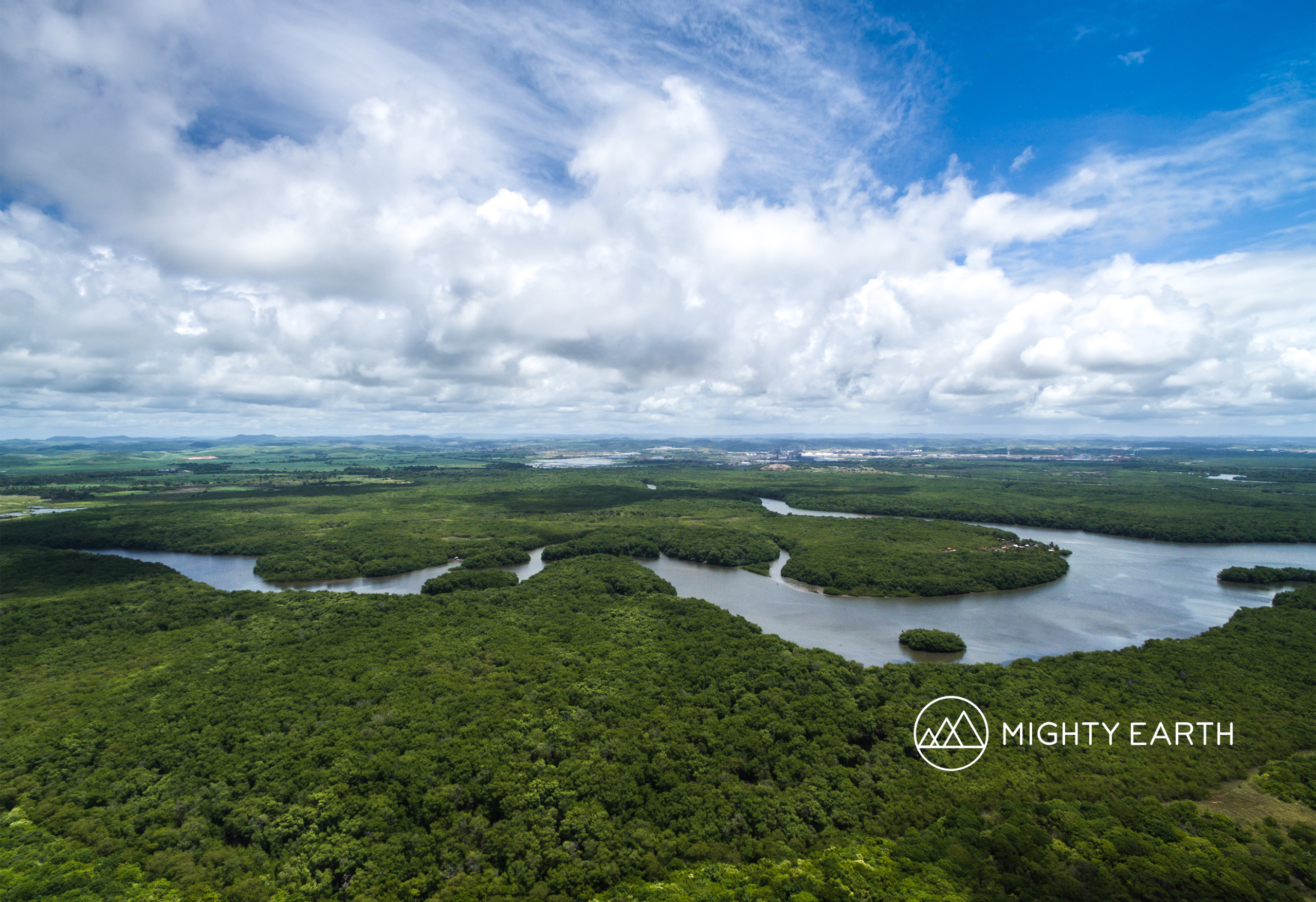The Companies Behind the Burning of the Amazon
August 2019
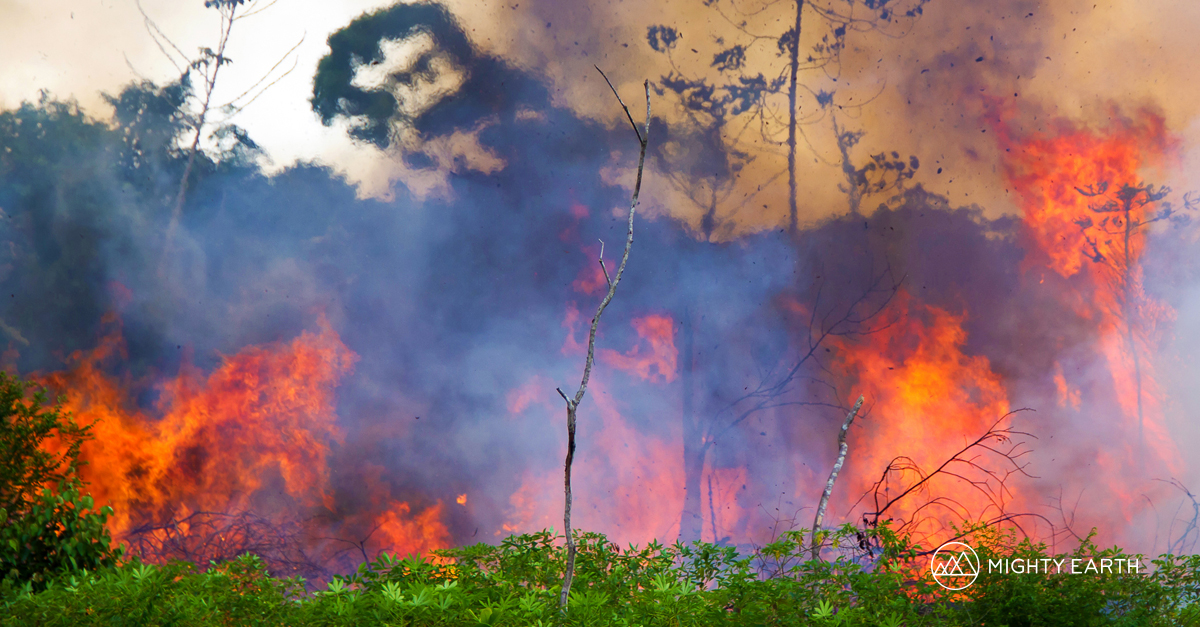
The burning of the Amazon and the darkening of skies from Sao Paulo, Brazil, to Santa Cruz, Bolivia, have captured the world’s conscience. Much of the blame for the fires has rightly fallen on Brazilian President Jair Bolsonaro for directly encouraging the burning of forests and the seizure of Indigenous Peoples’ lands.
But the incentive for the destruction comes from large-scale international meat and soy animal feed companies like JBS and Cargill, and the global brands like Stop & Shop, Costco, McDonald’s, Walmart/Asda, and Sysco that buy from them and sell to the public. It is these companies that are creating the international demand that finances the fires and deforestation.
The transnational nature of their impact can be seen in the current crisis. Their destruction is not confined to Brazil. Just over the border, in the Bolivian Amazon, 2.5 million acres have burned, largely to clear land for new cattle and soy animal feed plantations, in just a few weeks. Paraguay is experiencing similar devastation.
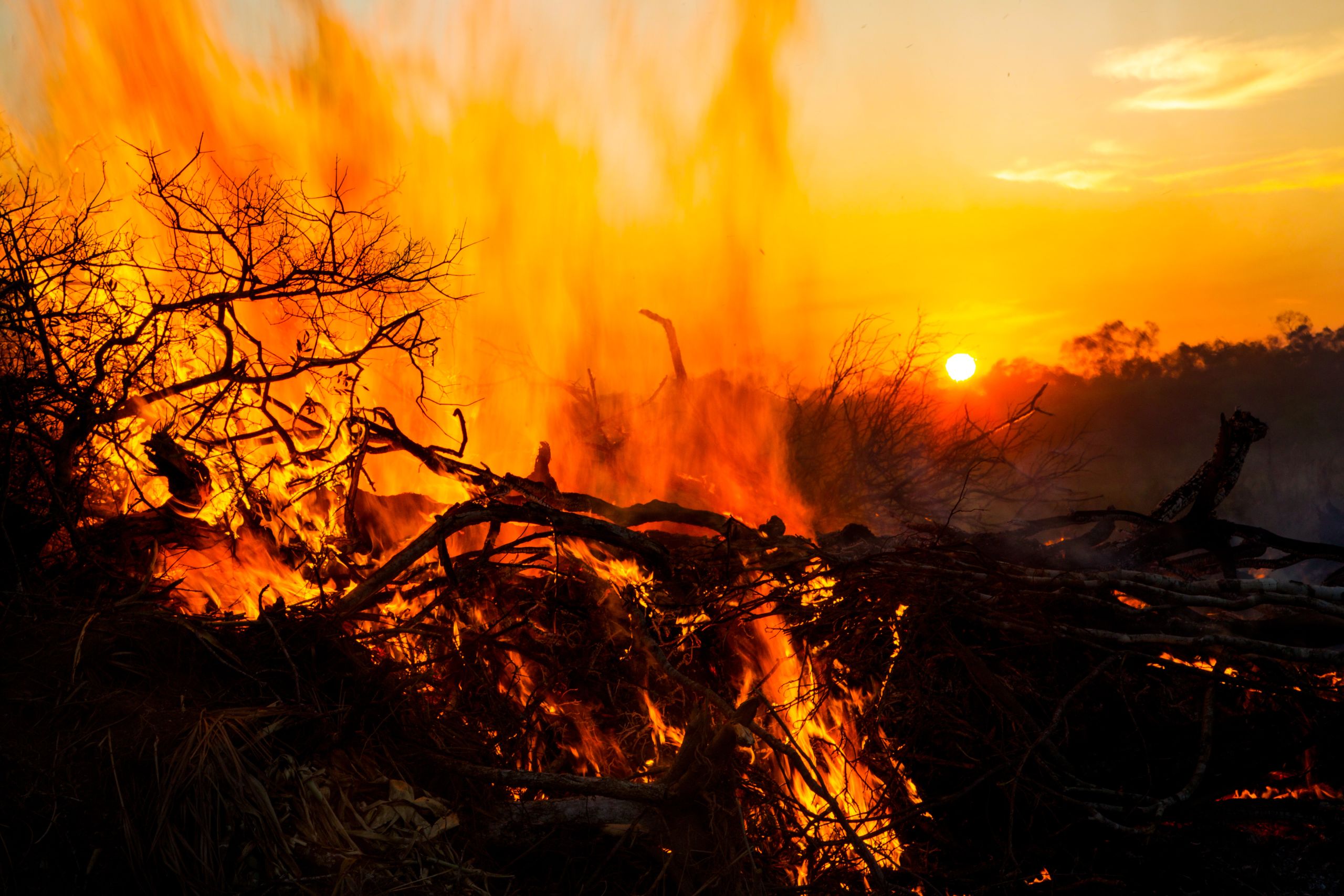
Logs burn at sunset in Bolivia. Photo Credit: 2017, Jim Wickens/Ecostorm
Logs burn at sunset in Bolivia. Photo Credit: 2017, Jim Wickens/Ecostorm
New maps and analysis from Mighty Earth, based on data from NASA, CONAB, and Imazon and released here for the first time, show which companies are most closely linked to the burning:
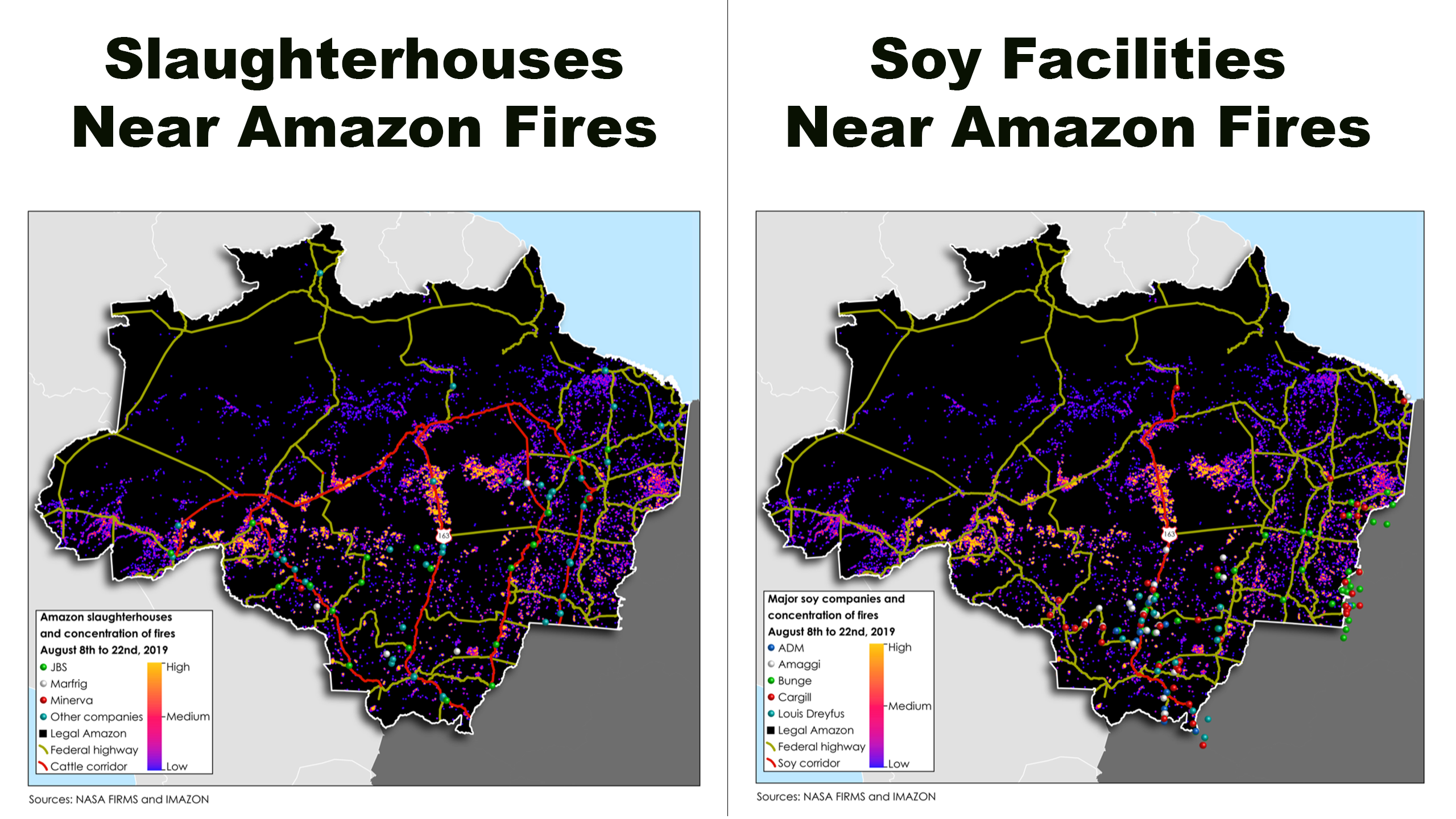
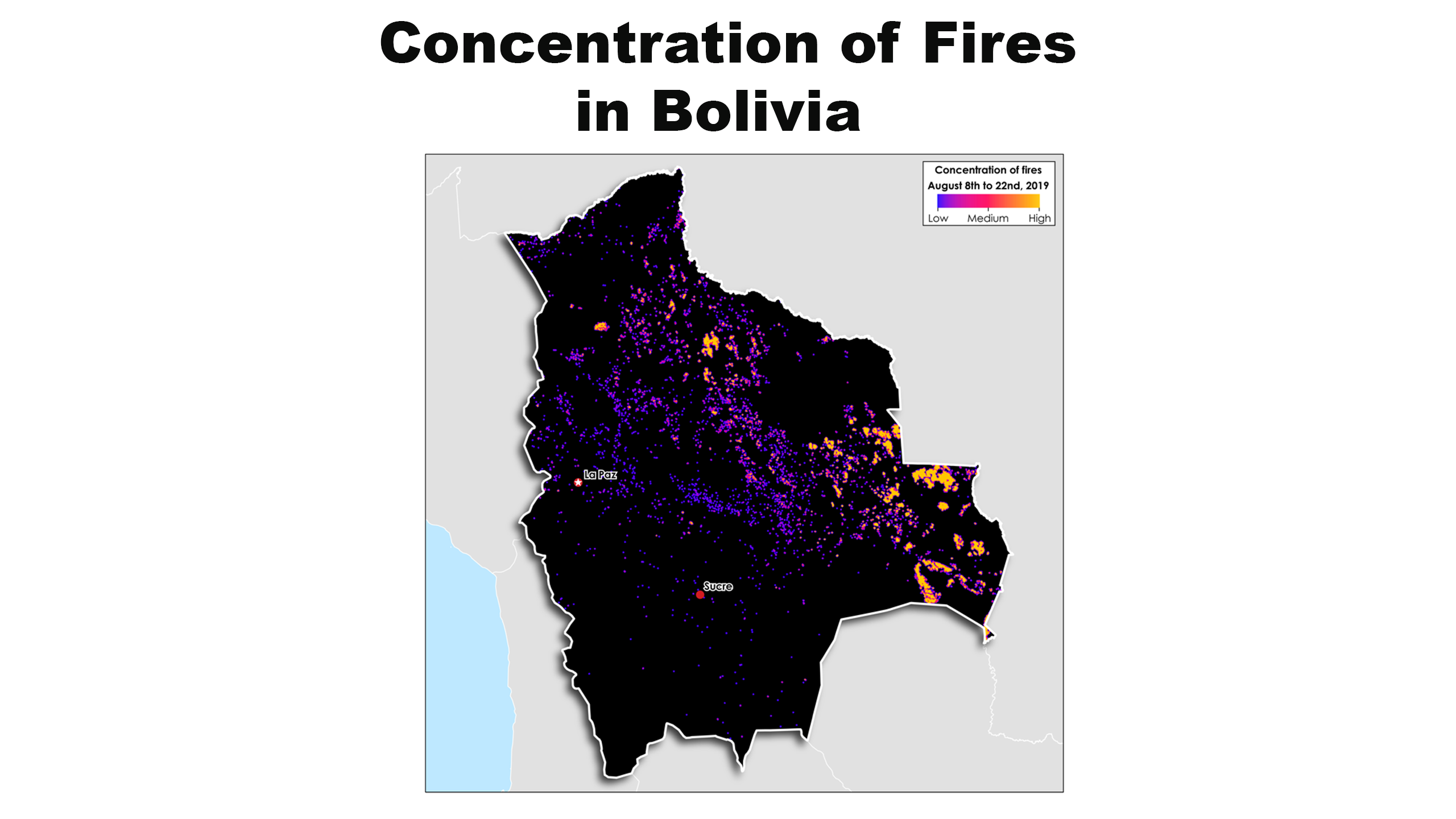
Cattle
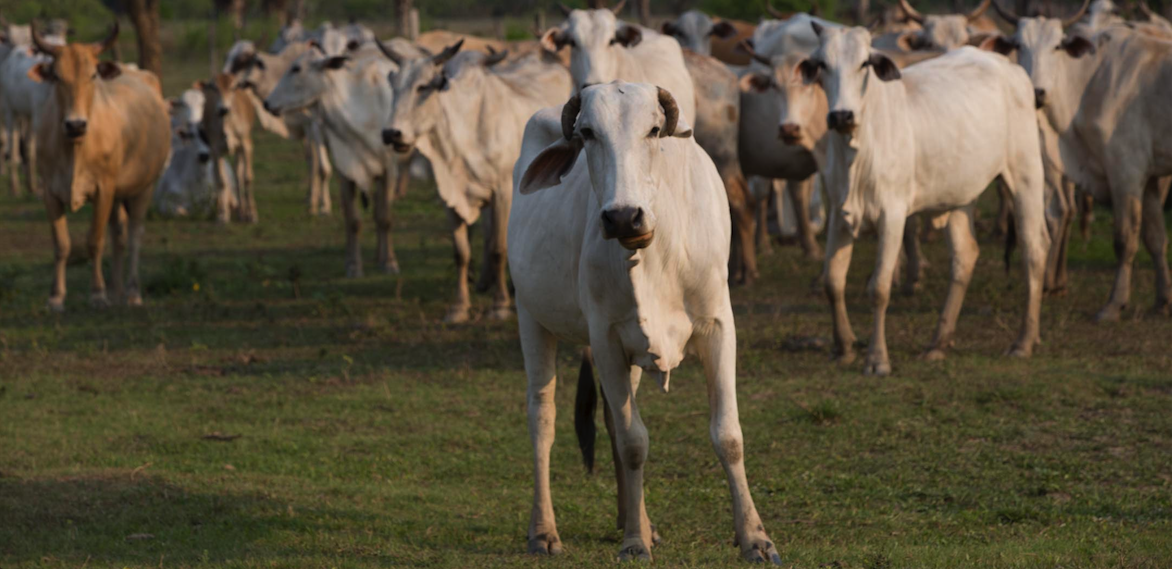
Both domestic and international demand for beef and leather has fueled the rapid expansion of the cattle industry into the Amazon. From 1993 to 2013, the cattle herd in the Amazon expanded by almost 200% reaching 60 million head of cattle. While deforestation for cattle had been reduced thanks to both private sector and government action, the new wave of deforestation this year shows that the large international beef and leather companies and their customers and financiers continue to create markets for deforestation-based cattle.
The effects of this demand can be seen in the clustering of deforestation near slaughterhouses and roads that have access to slaughterhouses. The company most exposed to deforestation risk in the maps above is JBS, both Brazil’s largest meatpacker, and the world’s largest meat company. JBS, like other major Brazilian meatpackers signed the 2009 Cattle Moratorium, pledging not to buy beef from cattle connected to deforestation. However, investigations by government and NGOs have repeatedly found serious violations by JBS, including through laundering cattle.
These scandals reached their apotheosis with the Cold Meat (Carne Fria) scandal in 2017, in which the Brazilian government enforcement agencies produced extensive evidence showing that JBS was sourcing cattle from protected areas. This and other investigations found that JBS violated both government and its own policies by buying laundered cattle that had been raised in areas linked to deforestation and then transported to “clean ranches” to evade the requirements. The two brothers who control the company were imprisoned for their role in corruption scandals in Brazil.
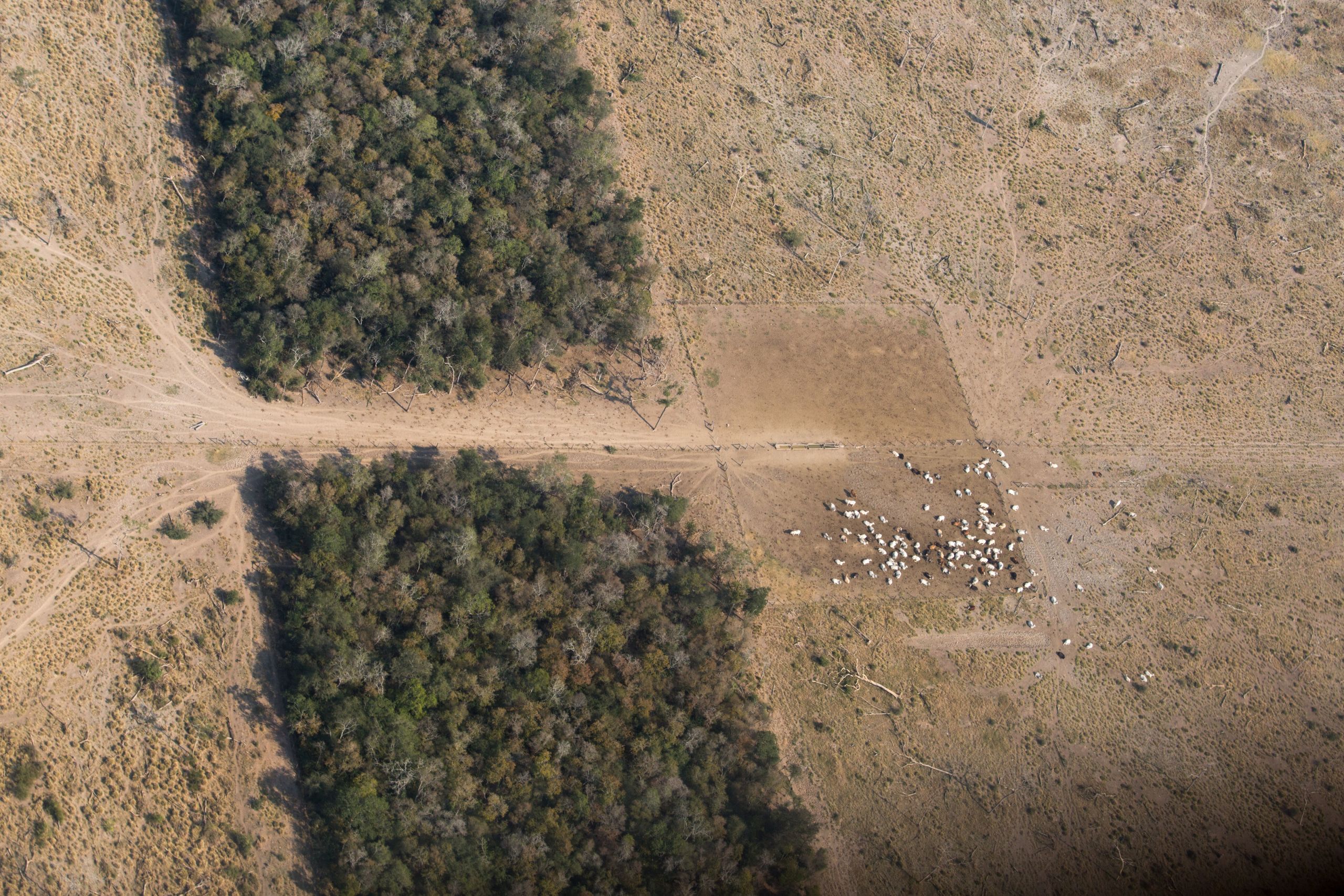
Aerial cattle field and forest edge. Photo credit: Jim Wickens/Ecosotrm
Aerial cattle field and forest edge. Photo credit: Jim Wickens/Ecosotrm
Soy
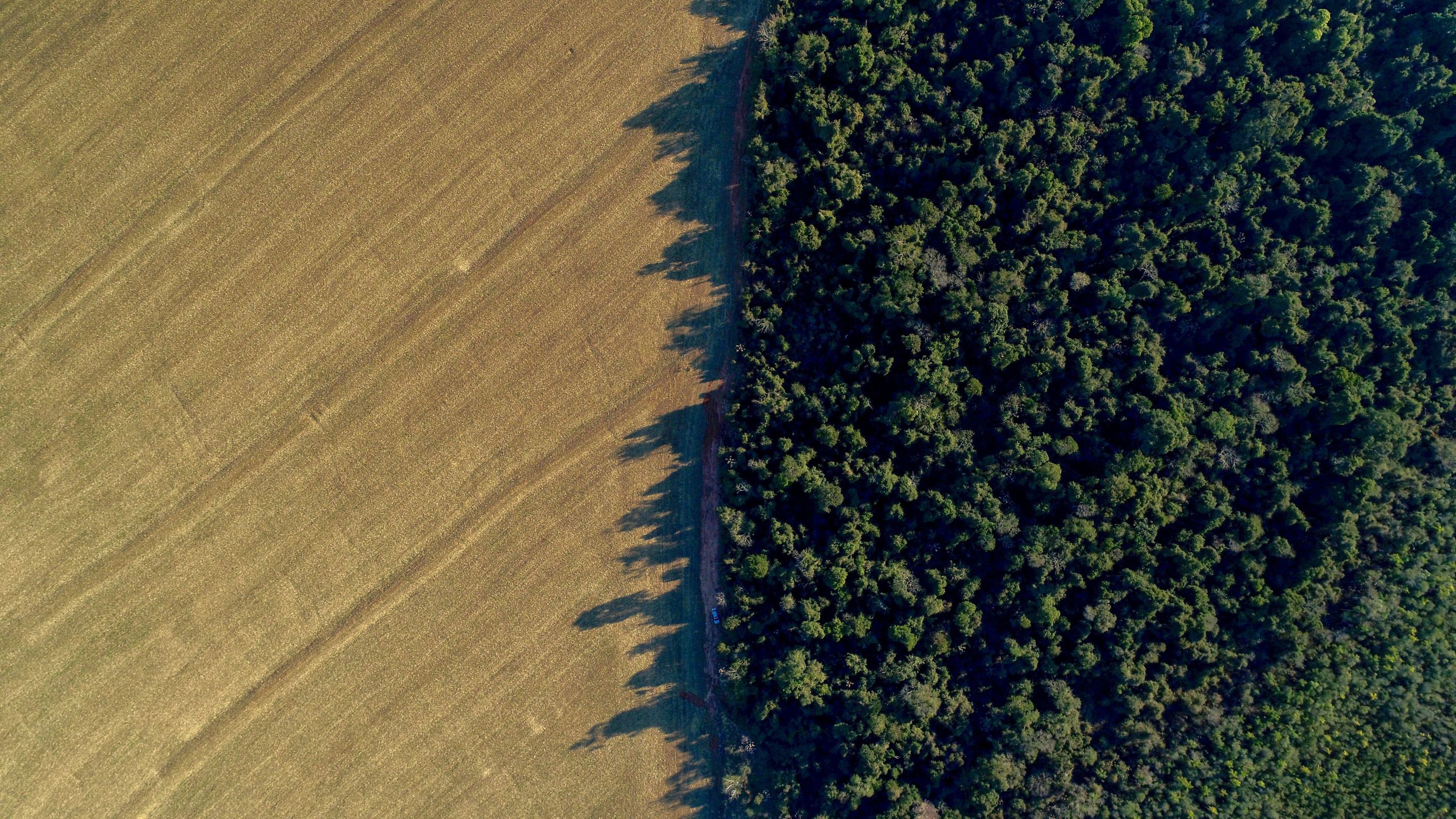
Soy supply chains work differently from cattle, and that is reflected in the maps above. Much of the current wave of deforestation has happened close to BR-163. Big soy farmers routinely transport their soy down Highway BR-163 to Cargill’s major port at Santarem, where it is put on ships and sent around the world to be fed to livestock in Europe, China, and elsewhere. There are similar dynamics around other highways on the map. Cargill, Bunge and other leading soy traders have participated in the Amazon Soy Moratorium in Brazil for the last dozen years, in which they committed to cease sourcing from suppliers who engaged in deforestation for soy. Overall, the Soy Moratorium has been a major success, virtually eliminating deforestation for soy.
However, the Soy Moratorium contained two major loopholes. First, the big soy traders can continue to purchase soy from farmers who engage in large-scale deforestation, as long as the deforestation is for crops other than soy. The location of the deforestation close to BR-163 suggests that farmers are exploiting this loophole to continue deforestation even as they sell soy to major traders like Cargill and Bunge. The location of the deforestation close to BR-163 suggests that farmers are exploiting this loophole to continue deforestation even as they sell soy to major traders like Cargill and Bunge.
Second, the Soy Moratorium only applies to the Brazilian Amazon. Major soy traders have continued to drive deforestation in the Bolivian Amazon Basin, the Brazilian Cerrado, and the Gran Chaco of Argentina and Paraguay, creating a major incentive for the rapid deforestation in Bolivia in the last several weeks. Mighty Earth’s reports The Ultimate Mystery Meat and Still At It showed Cargill’s extensive links to deforestation in the Bolivian Amazon basin, and its repeated refusal to take action against key suppliers even when confronted with repeated evidence. And as much attention as the Amazon is getting, Brazil’s half a billion acre, highly biodiverse forest-savannah mosaic known as the Cerrado has been even more deforested. While 80% of the Amazon is still intact, cattle, soy and agriculture interests have destroyed more than half of the Cerrado, putting this ecosystem at even greater risk. Mighty Earth found that in the Cerrado, where deforestation has continued, two companies were primarily responsible for driving deforestation, Cargill and Bunge.
Cargill is the largest trader of soy from Brazil and the world’s largest food and agriculture company. Mighty Earth’s July 2019 report The Worst Company in the World profiled Cargill’s extensive deforestation in South America and elsewhere around the world, building on previous investigations in Bolivia, Brazilian Cerrado, Paraguay, and Argentina.
Although Bunge is a bigger player in the Cerrado, across South America - in Bolivia, Paraguay and Argentina, Mighty Earth’s previous analyses of deforestation linked to soy animal feed in South America found Cargill most closely associated with deforestation. The company has refused to discontinue suppliers Mighty Earth found engaged in deforestation after evidence was shared with them, and has bitterly resisted efforts to expand successful industry-wide platforms for monitoring and policing deforestation to South America outside the Brazilian Amazon.
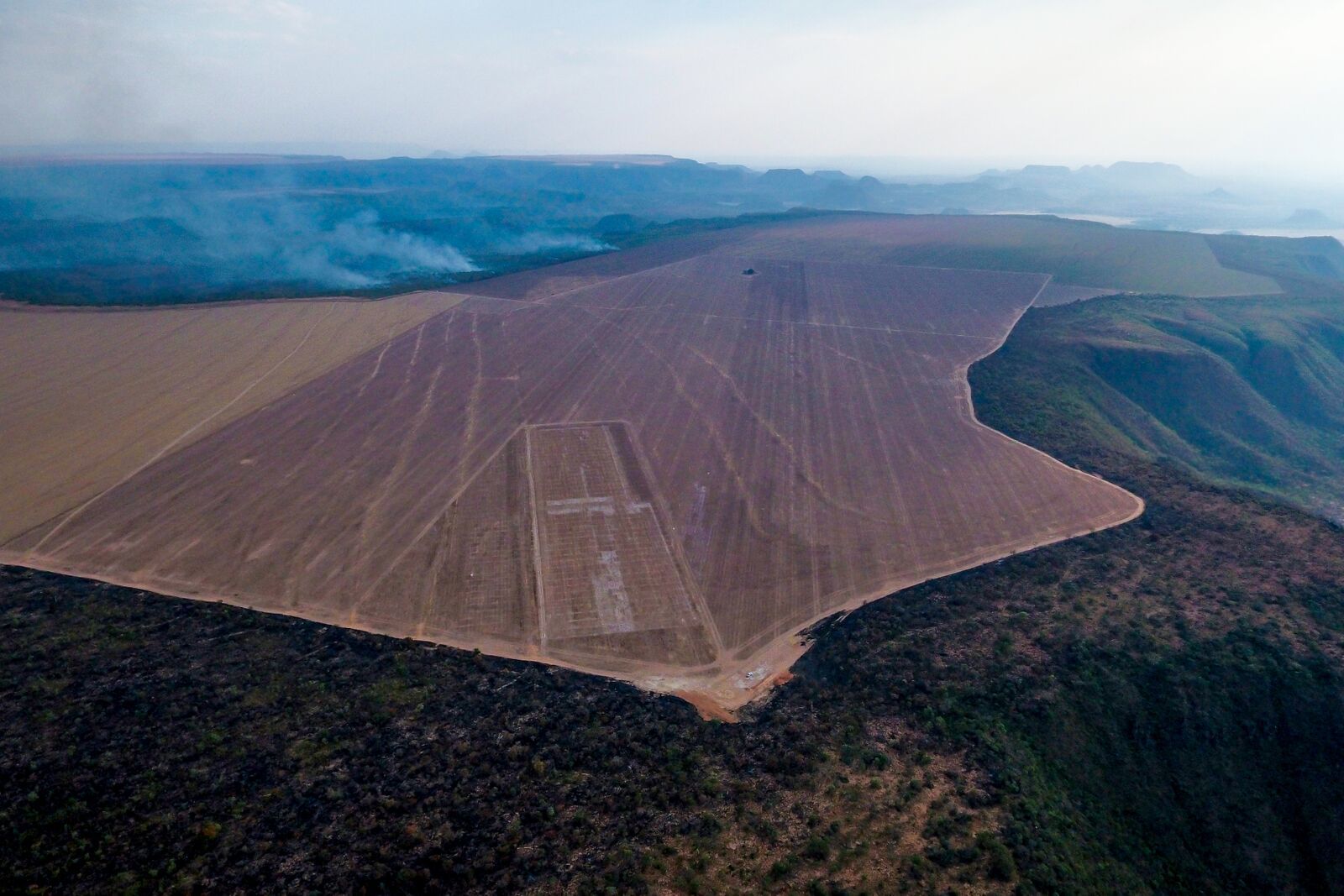
Table top mountains in the Brazilian Cerrado reduced to soy cultivation. Photo credit; Jim Wickens/Ecostorm
Table top mountains in the Brazilian Cerrado reduced to soy cultivation. Photo credit; Jim Wickens/Ecostorm
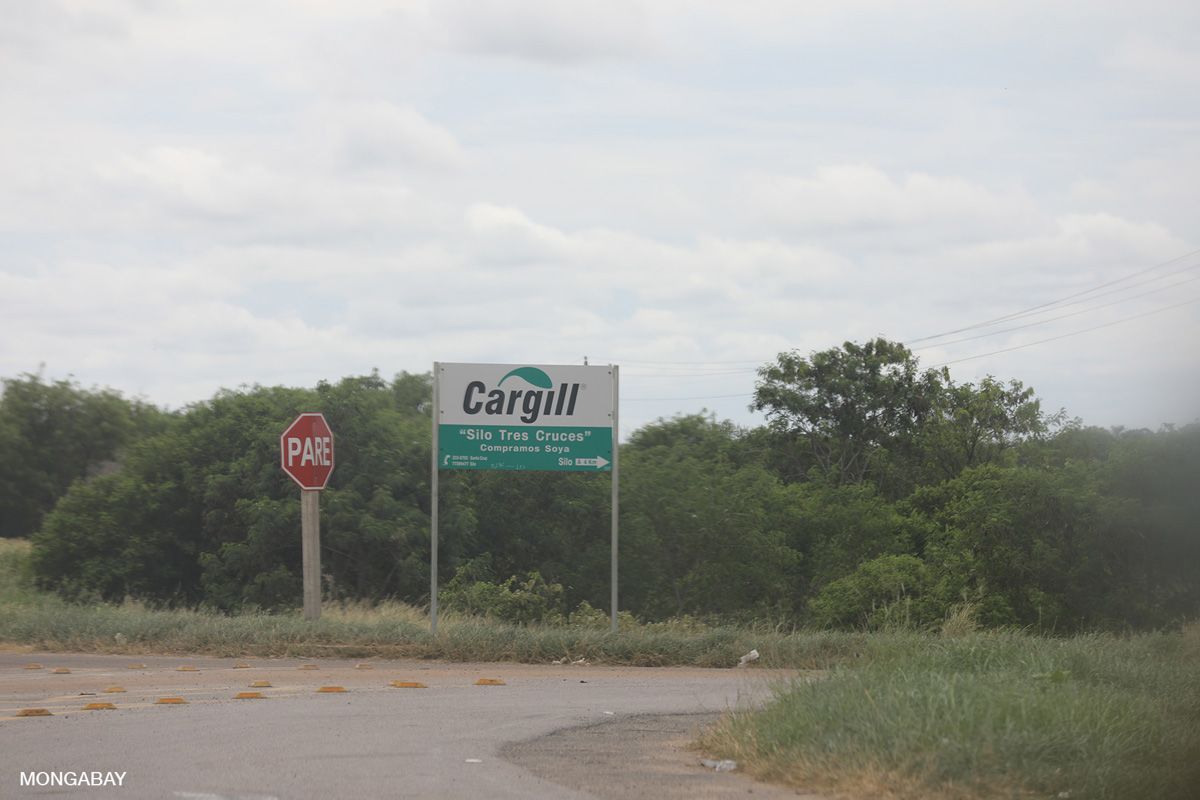
Sign for a Cargill silo in Bolivia reads 'We buy soy'. Cargill is the biggest privately-held company in the U.S., and while it might not be a household name, people consume its products every day. Photo credit: Rhett A. Butler
Sign for a Cargill silo in Bolivia reads 'We buy soy'. Cargill is the biggest privately-held company in the U.S., and while it might not be a household name, people consume its products every day. Photo credit: Rhett A. Butler
Five years ago, companies including Cargill, Unilever, and Yum Brands stood on stage at the Climate Summit in New York and proclaimed their commitment to removing deforestation from their supply chains by 2020. So too has the Consumer Goods Forum, whose members include Walmart, Mars and Danone.
They have yet to deliver on this commitment.
Now, with one year until their deadline and the Amazon in flames, it is far past time to act.
These companies must take responsibility for the impacts of their products. They must eliminate the market incentives that promote this reckless environmental destruction.
The Consumer Goods Forum and companies like McDonald’s, Burger King, and Ahold Delhaize – which owns Stop & Shop as well as Hannaford, Food Lion, Pea Pod, and Giant supermarkets – cannot continue to look the other way while the Amazon burns. They should instead source only from suppliers and regions that show evidence of eliminating deforestation. Not in another ten years. Not in five years. Not in one year. Now. Today.
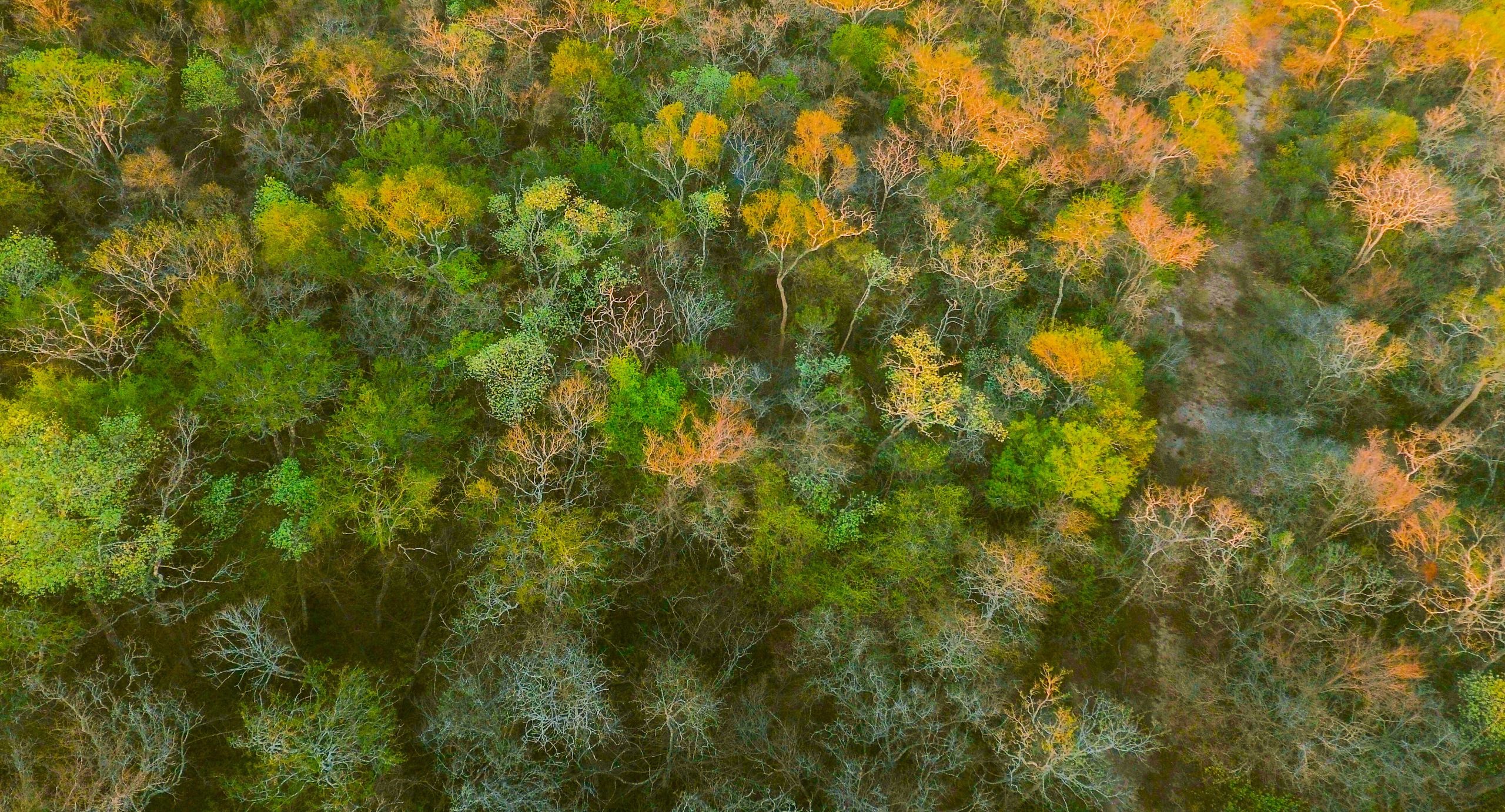
The chart below shows the largest customers of the slaughterhouses and soy animal feed traders most associated with cattle and soy deforestation, respectively.
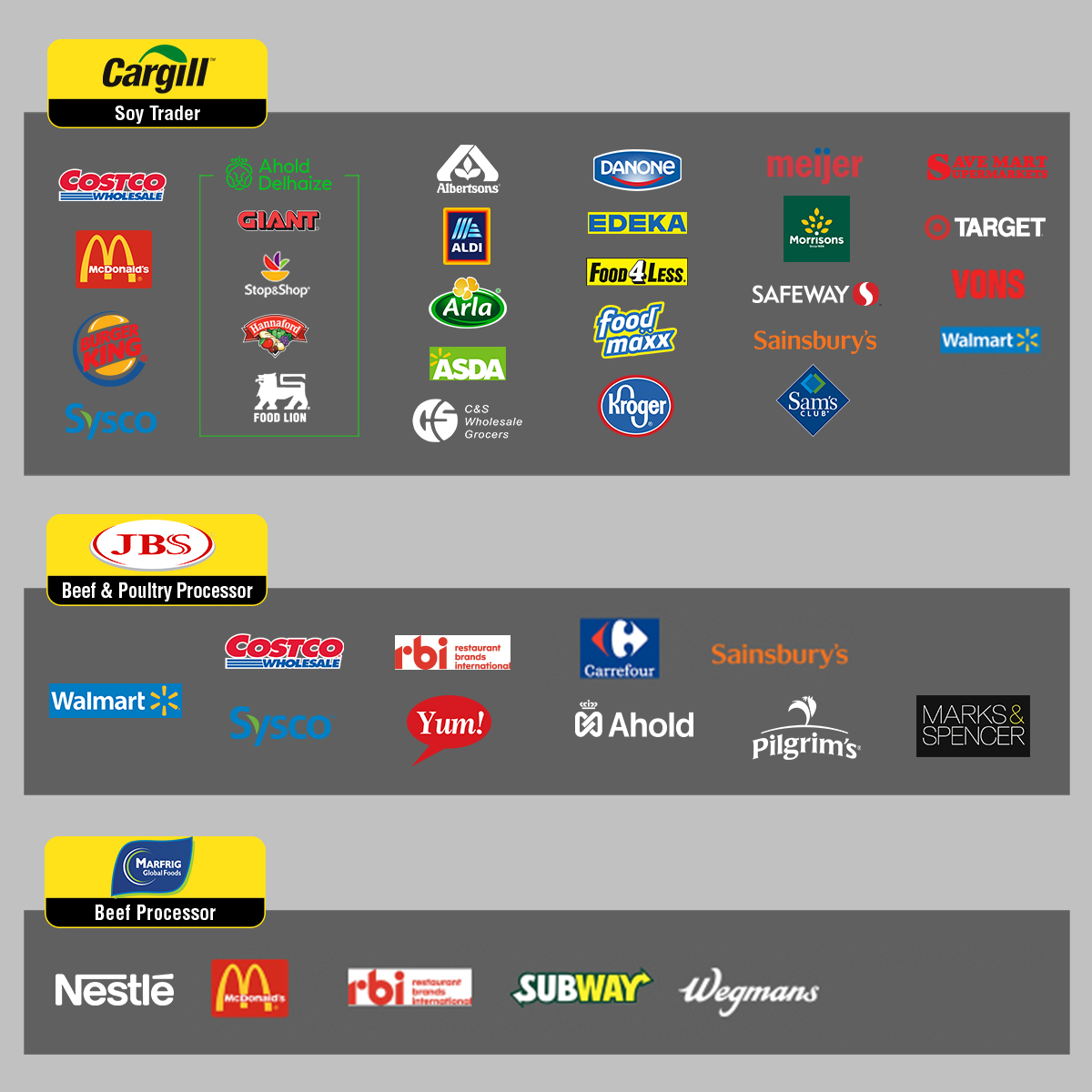
Brands
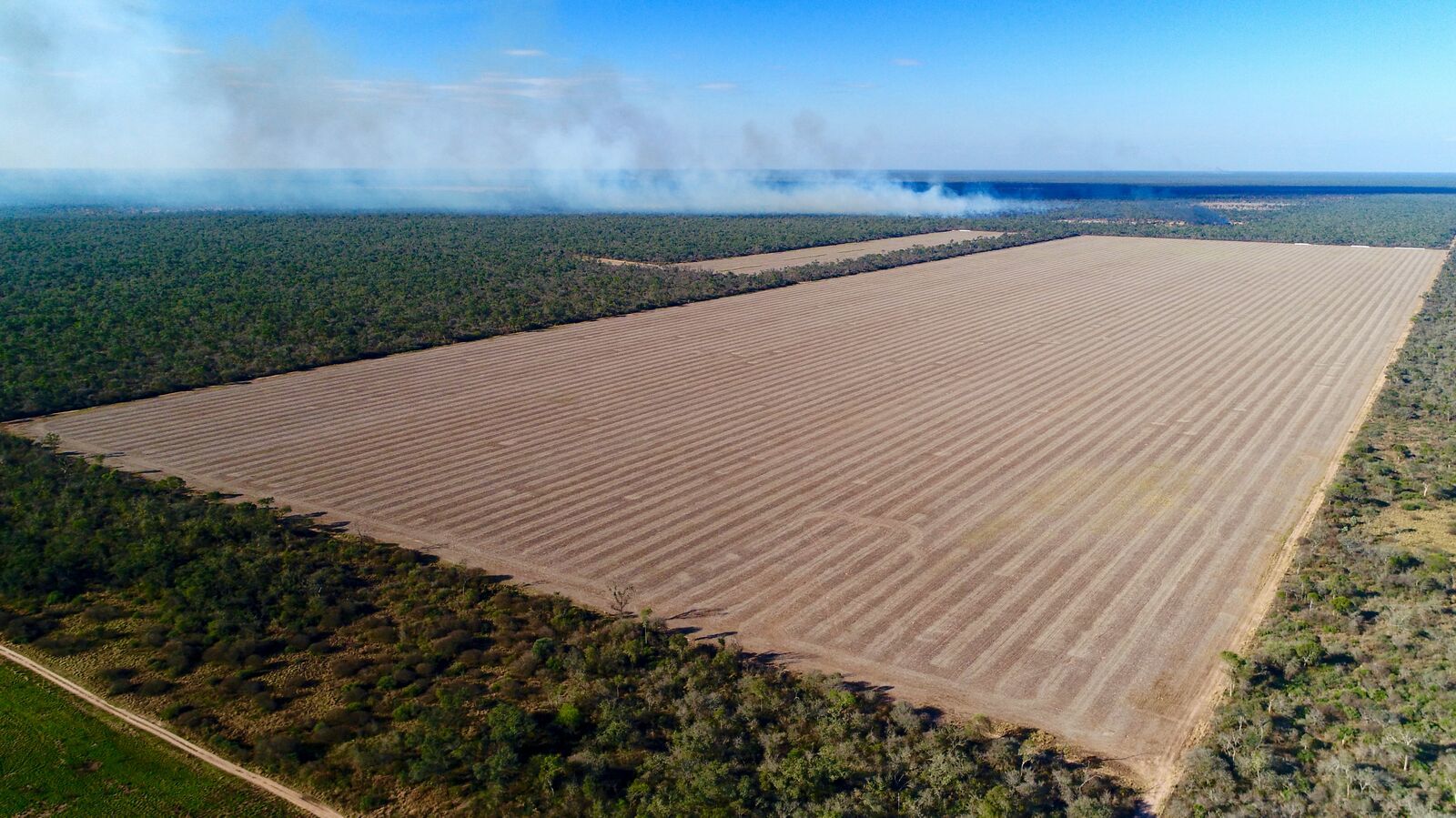
Several brands stand out for their contracts and relationships with the suppliers most responsible for deforestation.

Ahold Delhaize: The Netherlands-based supermarket powerhouse owns the brands Stop & Shop, Giant, Food Lion, and Hannaford in the United States and Albert Heijn, Delhaize, Etos, Albert, Alfa-Beta, and others across Europe. While consistently touting its sustainability commitments, Ahold continues selling its customers products from some of the worst companies in the world. With knowledge of Cargill’s ongoing child labor issues and its role in deforestation across South America, Ahold has simultaneously pushed Cargill to do a better job even while launching a joint venture partnership with them to provide the store-branded meat to Stop & Shop stores. In addition, Ahold Delhaize conducted business worth a whopping $113 million with JBS in 2019 through food sales and other partnerships.
As egregious as Ahold Delhaize’s actions are, they are not alone:
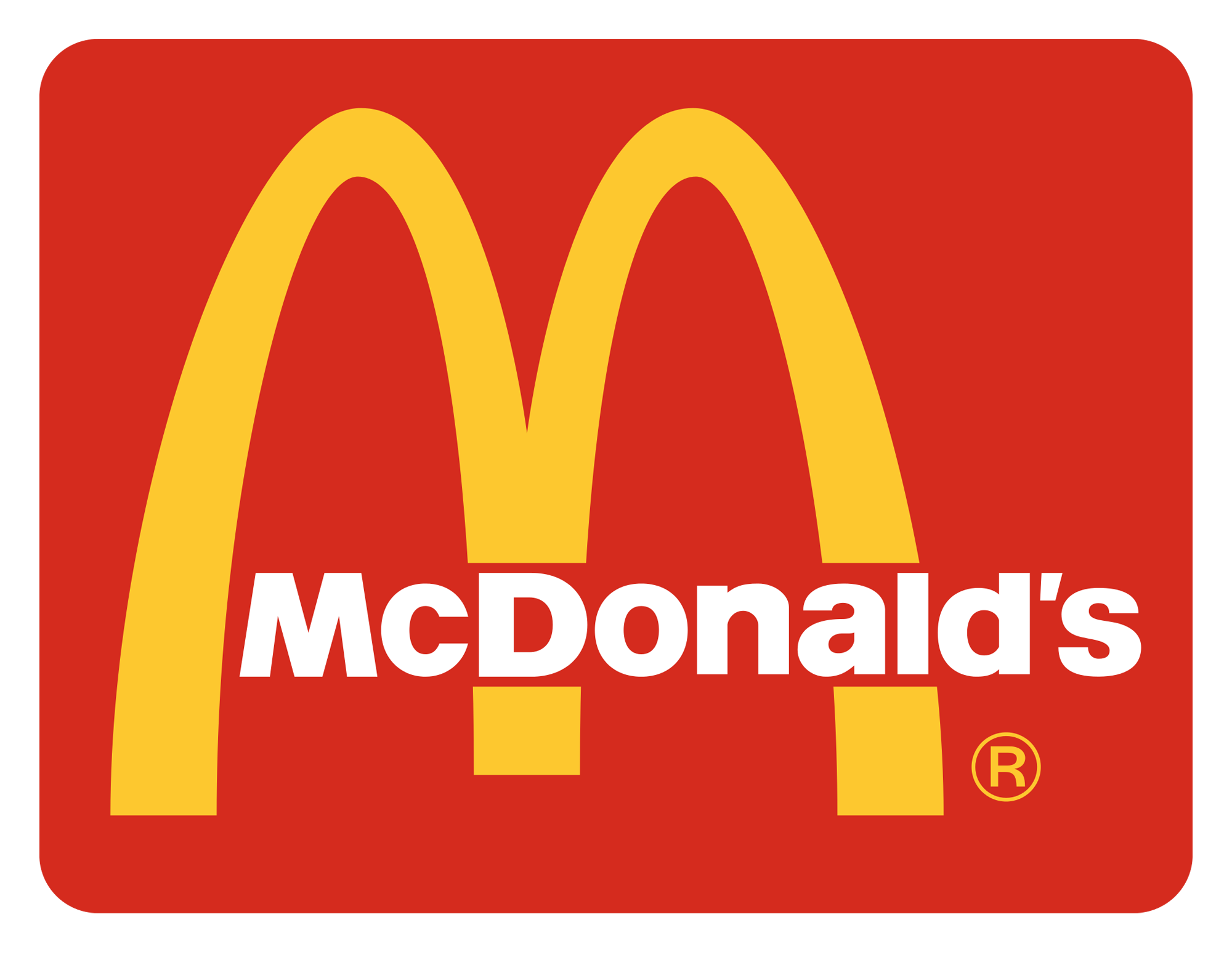
McDonald’s: McDonald’s is probably Cargill’s largest and most important customer. McDonald’s restaurants are essentially storefronts for Cargill. Cargill not only provides chicken and beef to McDonald’s, they prepare and freeze the burgers and McNuggets, which McDonald’s simply reheats and serves.
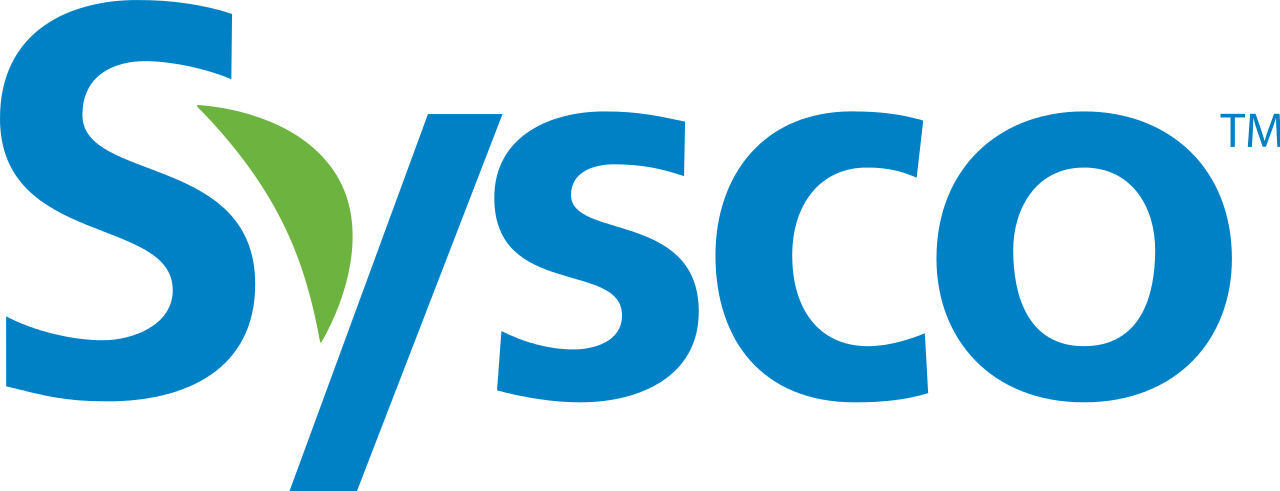
Sysco: With $55 billion in annual revenue, Sysco is the world’s largest distributor of food products to restaurants, healthcare facilities, universities, hotels, and inns. Despite claiming that they will “protect the planet by advancing sustainable agriculture practices, reducing our carbon footprint and diverting waste from landfill, in order to protect and preserve the environment for future generations,” they have honored Cargill as their most valued supplier of pork and beef and did $525 million worth of business with JBS in 2019 through sales and other partnerships.

Costco: Both JBS and Cargill list Costco as one of their top customers. Popular with families and small business owners, it ranks as the world’s third largest retailer. Costco states that it “has a responsibility to source its products in a way that is respectful to the environment and to the people associated with that environment.” According to their website, “Our goal is to help provide a net positive impact for communities in commodity-producing landscapes, by doing our part to help reduce the loss of natural forests and other natural ecosystems, which include native and/or intact grasslands, peatlands, savannahs, and wetland.” Nevertheless, according to Bloomberg, Costco conducted $1.43 billion worth of business with JBS in 2019.
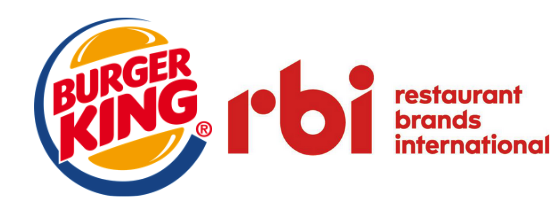
Burger King/Restaurant Brands International: Burger King’s practice of selling meat linked to Cargill and other forest destroyers has earned the fast food giant a ‘zero’ on the Union of Concerned Scientists deforestation scorecard. Burger King has asked Cargill to stop destroying forests in their supply chain…but the deadline isn’t until 2030. It is also a significant customer of JBS. Burger King is part of the Restaurant Brands International (RBI) chain that also includes Tim Horton’s and Popeye’s.

Nestle: Based in Switzerland, Nestle is the largest food and beverage company in the world. Nestle was among the first companies to make zero-deforestation commitments, but only started actually monitoring its supply chains nine years later in 2019 – and only for palm oil, not for soy or pulp/paper. Recently certifying 77 percent of its supply chain as deforestation-free, Nestle continues to buy from Cargill for its pet food subsidiary, Nestle Purina Petcare. Bloomberg data also shows Nestle as one of Marfrig’s top customers.

Carrefour: The French company Carrefour is one of the world’s largest supermarket chains, the majority owner of the largest supermarket chains in Brazil, and at risk for cattle-driven deforestation. It has significant supply chain links to Cargill and JBS. Carrefour has committed to eliminating deforestation from its products by 2020, but the policy does not apply to processed or frozen beef products—which means that only around half of Carrefour’s beef distribution in Brazil is covered by its zero-deforestation policy. According to Chain Reaction Research, 35 percent of the beef and beef products it sampled came from slaughterhouses located within the Legal Amazon including a 2.3 percent from high-risk slaughterhouses.
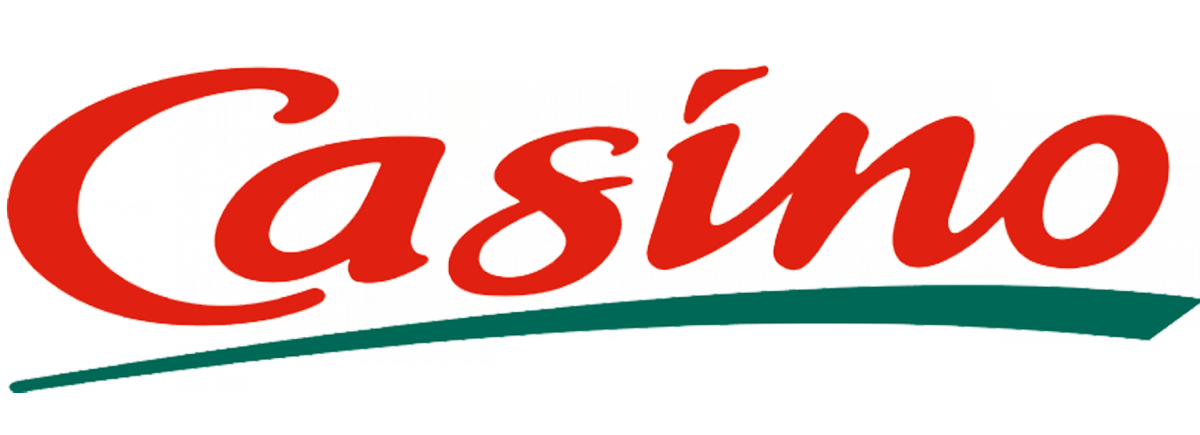
Casino: Casino, which owns Pão de Açúcar, is a French supermarket giant that prizes its reputation for sustainability in its home country. But as the second-largest supermarket chain in Brazil, it continues to purchase from Cargill, Bunge, and Brazil’s major cattle suppliers.

Walmart: Arkansas-based corporation Walmart is the single-largest company in the world by revenue, and also the largest private employer. Walmart also has a major presence in the UK, through its wholly-owned subsidiary ASDA. Walmart’s stated policy is “as a member of the Consumer Goods Forum, we supported the resolution to achieve zero net deforestation in our supply chain by 2020,encourage our suppliers of [beef, soy, palm oil, pulp and paper] products to work to source products produced with zero net deforestation. We ask suppliers to avoid ancient and endangered forests, to encourage conservation solutions, and to increase recycled content.” Nevertheless, Walmart conducted business with JBS worth $1.68bn in 2018 and remains a leading customer of Cargill meats and other products.

E. Leclerc: E.Leclerc is a French retail chain, with more than 600 locations in France and more than 120 stores outside of the country. Of the supermarket chains in France, Leclerc has perhaps the least robust sustainability policies. A recent report by Sherpa, France Nature Environment and Mighty Earth shows Leclerc failing on soy sustainability measures across the board. The company refuses to join industry calls to protect the endangered Cerrado, has not fulfilled legal obligations to disclose its sources, and has neither develop an alert mechanism to identify risk or follow up on deforestation alerts provided by others. E.Leclerc’s latest sustainability report makes no commitments on meat sourcing, or any other commodity but palm oil.
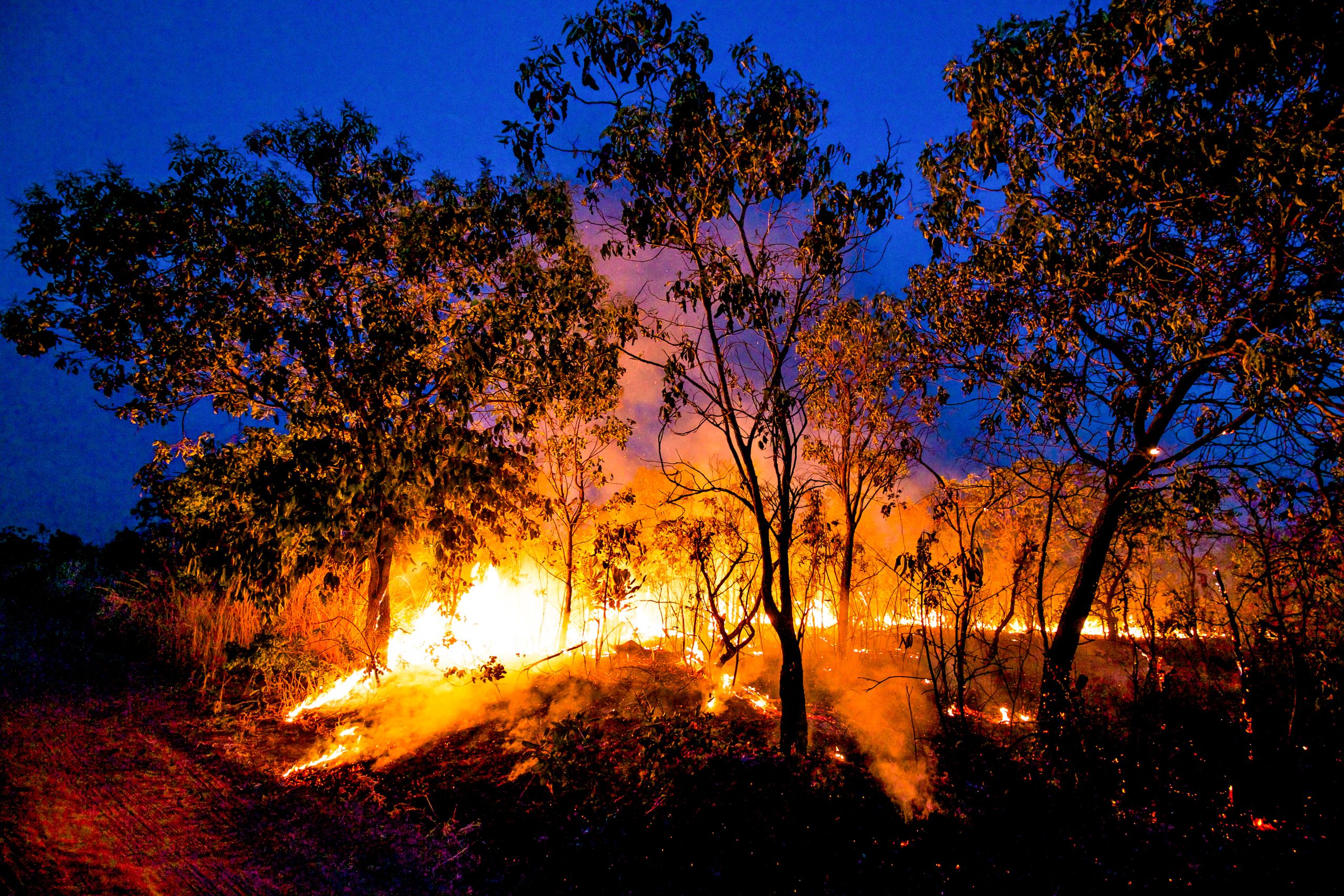
By night forest fires can be seen for miles, tearing through Brazil's Cerrado ecosystems. Photo credit: 2017, Jim Wickens/Ecostorm
By night forest fires can be seen for miles, tearing through Brazil's Cerrado ecosystems. Photo credit: 2017, Jim Wickens/Ecostorm
A Preventable Disaster
While the rate of burning has increased dramatically in the last several months in response to Bolsonaro’s policies, these companies have been driving deforestation for years across South America. In many cases, they have bitterly resisted efforts to create systems that would allow for agriculture to expand without deforestation.
Bolsonaro’s mobilization of the army to fight the fires may help in the short term, as will Bolivian president Evo Morales’ new willingness to accept international help to fight fires. But as long as these international companies are creating a market for beef, pork, and chicken that is indifferent to deforestation, this type of environmental disaster is likely to continue.
After years of remarkably successful conservation initiatives that cut Brazil’s deforestation rate by two-thirds, Brazil’s president Jair Bolsonaro has reopened the doors to rampant destruction as a favor to the agribusiness lobby that backs him. That industry is accountable for the atmosphere of lawlessness, deforestation, fires, and the murder of Indigenous peoples that followed. According to data released by Brazil’s National Institute for Space Research (INPE), deforestation of the Brazilian Amazon in July 2019 increased 278 percent over the previous July. Bolsonaro responded to this news by firing the head of the INPE.
The recent fires are the latest example of the cattle and soy industries trying to take advantage of a culture of impunity in both Brazil and Bolivia. Since January 2019, more than 74,000 fires have broken out across Brazil - an 85 percent increase from the same point in 2018. In Bolivia, 2.5 million acres have burned in two weeks.
These are not wildfires. Nearly all are the result of intentional land clearing attempts undertaken by ranchers and industrial soy farmers feeding global markets and international companies. In fact, on August 10, farmers in the Amazon held a “Day of Fire” to show their support for Bolsonaro's policies.
According to the Smithsonian Institute, these fires, which are large enough to see their effects from space, pose a significant threat to the “lungs” of the planet, one of the world’s last best defenses against climate change.
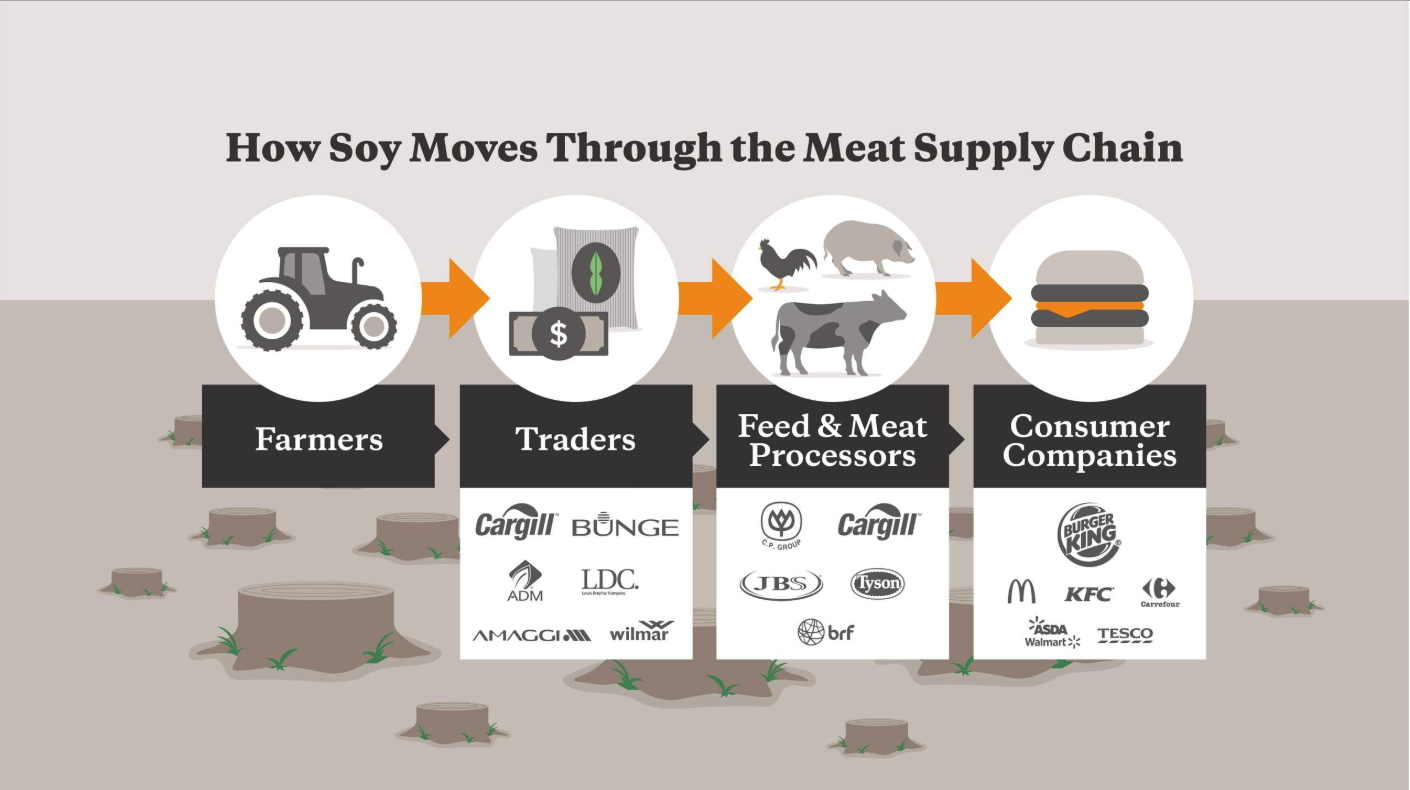
The deforestation crisis in Brazil and Bolivia wouldn’t be happening without companies like Cargill, Bunge, and JBS and their customers – companies like Stop & Shop, McDonald’s, Burger King, and Sysco – who create the market demand that finances the destruction.
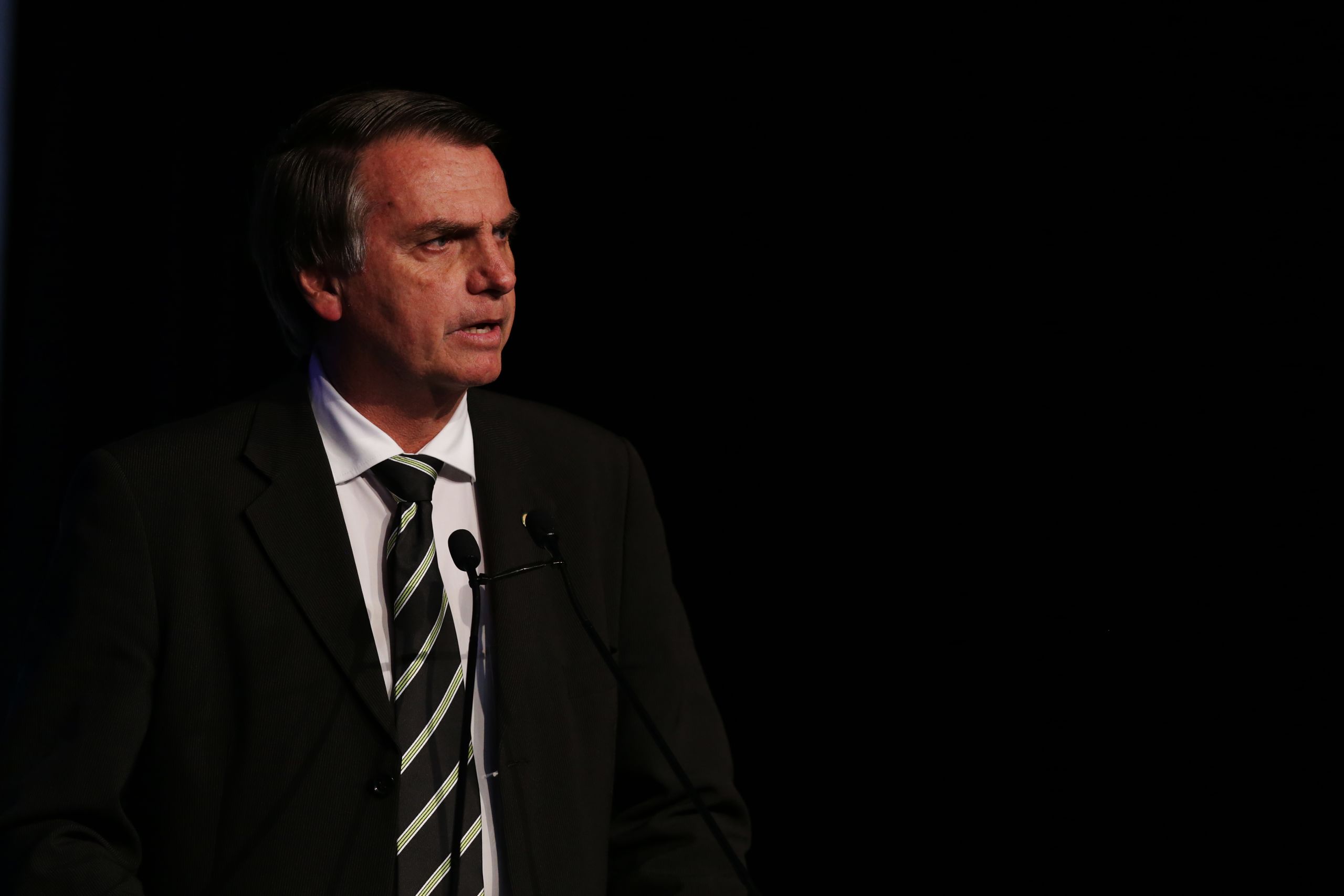
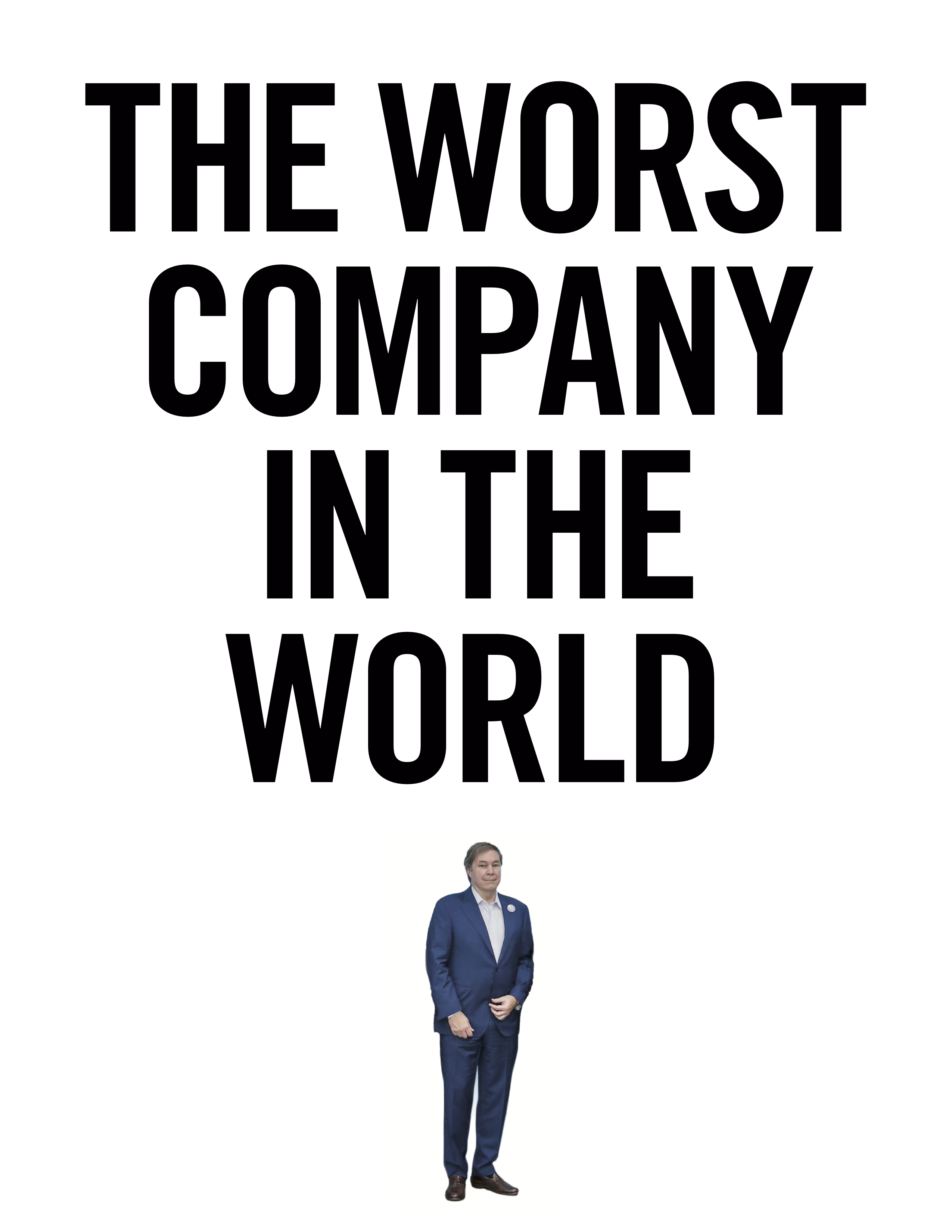
Mighty Earth is a global campaign organization that works to protect lands, oceans and the climate. Mighty Earth is a fiscally sponsored project of the Center for International Policy, a 501(c)3 non-profit organization.
